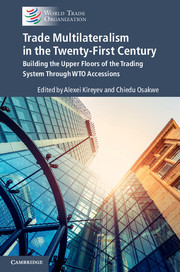 Trade Multilateralism in the Twenty-First Century
Trade Multilateralism in the Twenty-First Century from PART II - Negotiators’ Perspectives on the WTO Accession Process
Published online by Cambridge University Press: 28 November 2017
Abstract
On 14 July 2016, Liberia joined the World Trade Organization (WTO) as its 163rd member. Liberia's accession negotiations were done in 804 days since the appointment of the Chief Negotiator after stalling for over 6 years and 10 months since Liberia first applied for Accession. This unprecedented efficiency was made possible by a combination of factors. First, Liberia's determination at the highest political level allowed it to conduct accession negotiations with commitment and focus, while adhering to a time-bound roadmap. Speed and efficiency of accession-related reforms were essential, as the country had endured an almost simultaneous double shock – the Ebola epidemic and a sharp drop in commodity prices. Second, WTO members appreciated this determination and were ready to move faster than usual in the negotiating process to help put the country on track with trade-related reforms, in particular those aimed at overcoming the twin shocks. Third, the WTO wished to include Liberia's accession among the deliverables for its Tenth Ministerial Conference in Nairobi, the first ministerial conference to be held in Africa. The outcome was an accession that is now commonly referred to as the Liberian Model. An accession is concluded based on rational individual choices constructed around a vision for modernizing a country and its economy. This chapter highlights Liberia's transformation and its challenges, and discusses why WTO accession continues to be essential in facilitating Liberia's economic diversification agenda.
Liberia Before the Storm
The Republic of Liberia, Africa's oldest democracy, was founded in 1847. Freed slaves from the United States and the Caribbean arrived in Liberia and aspired to live in a free society where they could pursue their destiny and fulfil their potential free of the shackles of discrimination and persecution. The government and administrative systems were modelled after the United States. For over a century, Liberia experienced peace and stability until its first military coup in 1980, which resulted in a military regime that ruled the country for ten years. This regime plunged the nation into what would become a fourteen-year civil conflict, leading to complete devastation of the country and its economy. Virtually all of the pre-war infrastructure was destroyed or looted during the civil war, including roads, railways, electricity networks and power plants.
To save this book to your Kindle, first ensure [email protected] is added to your Approved Personal Document E-mail List under your Personal Document Settings on the Manage Your Content and Devices page of your Amazon account. Then enter the ‘name’ part of your Kindle email address below. Find out more about saving to your Kindle.
Note you can select to save to either the @free.kindle.com or @kindle.com variations. ‘@free.kindle.com’ emails are free but can only be saved to your device when it is connected to wi-fi. ‘@kindle.com’ emails can be delivered even when you are not connected to wi-fi, but note that service fees apply.
Find out more about the Kindle Personal Document Service.
To save content items to your account, please confirm that you agree to abide by our usage policies. If this is the first time you use this feature, you will be asked to authorise Cambridge Core to connect with your account. Find out more about saving content to Dropbox.
To save content items to your account, please confirm that you agree to abide by our usage policies. If this is the first time you use this feature, you will be asked to authorise Cambridge Core to connect with your account. Find out more about saving content to Google Drive.